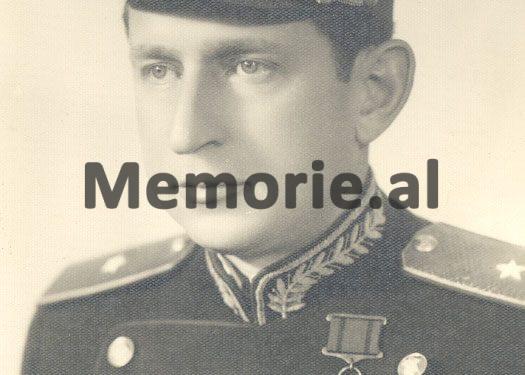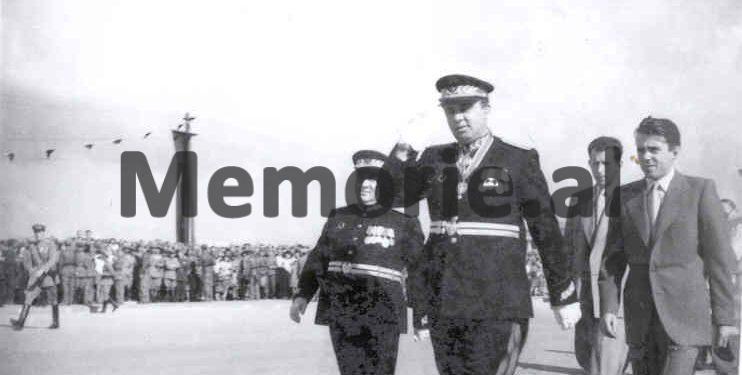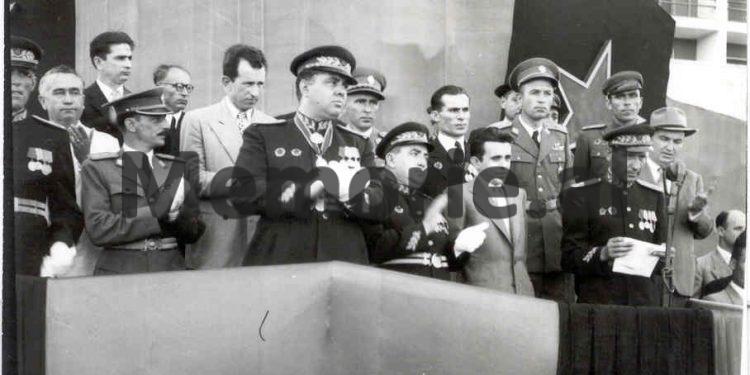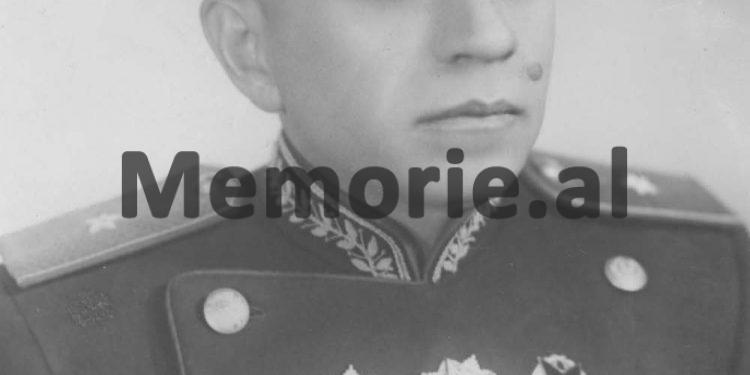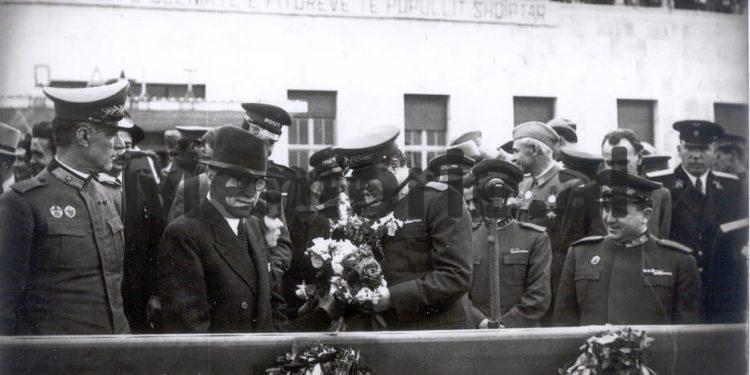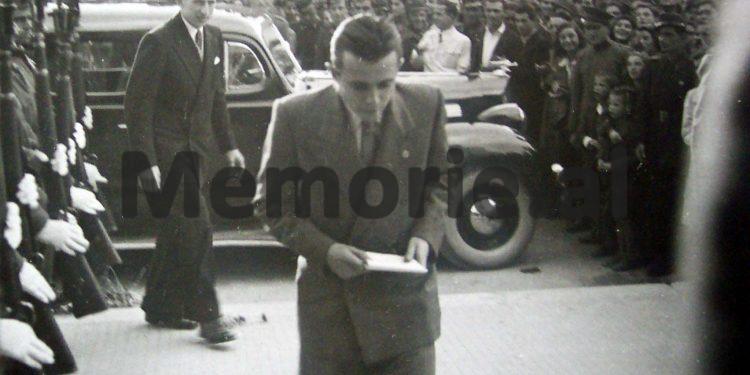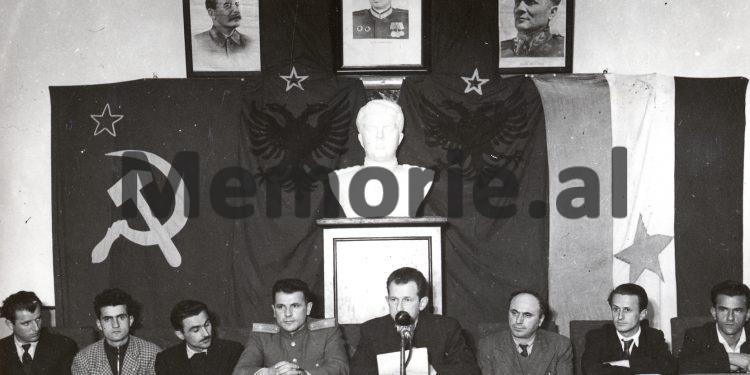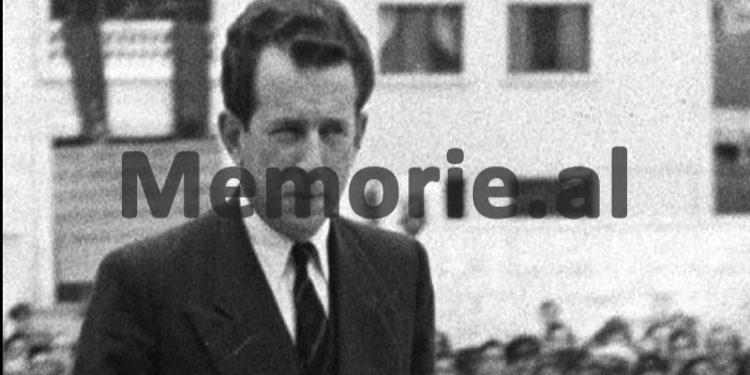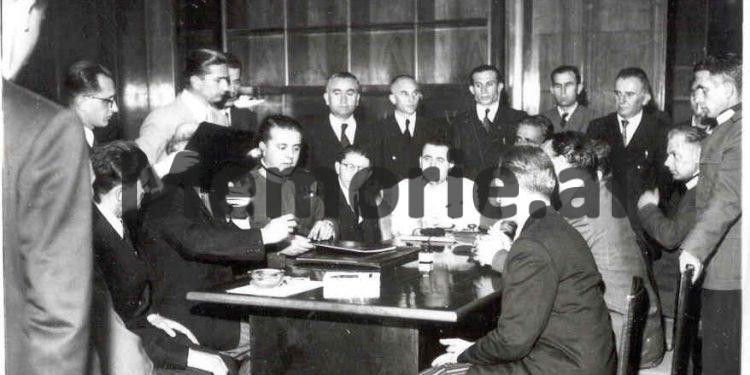Dashnor Kaloçi
Memorie.al publishes the unknown story of the conflicts that arose in the mid-1950s between Enver Hoxha and his two closest associates, Lieutenant General Tuk Jakova, one of the founders of the Communist Party of Albania, who had held the highest positions and functions in the Party and government after Enver Hoxha, and Major General Bedri Spahiu, a former member of the Politburo, General Prosecutor of the Republic and Minister of Education and Culture, conflicts that came after the visit he had made Tuk Jakova in the Museum House of the founding meeting of the Communist Party of Albania, where he revolted after the photo of Spiro Kolekë, who had not been a participant in that meeting on November 8, 1941. The rare testimonies of Colonel Mustafa Qilimi, former Vice President of the Supreme Court of the Republic, regarding the conflicts that arose after that event between Enver and Tuku and Bedri, after they both severely accused the “Commander” in the meetings of the Bureau and the Plenum, as well as Enver’s revenge afterward against the two former closest associates, were his order, Haki Toska told Aran Çela that they should be punished with death. How was it possible to forgive them for their lives, after Mustafa Qilimi himself and his colleague, Loni Dimoshi, the two vice-presidents of the Supreme Court, did not approve of that order, which forced Enver to “soften” a little and he ordered Aran Çela to sentence Tuk to 25 years and Bedri to 20.
After the first part of the interview where the former Vice President of the Supreme Court of the People’s Republic of Albania, Mustafa Qilimi, testified about the intrigues of the State Security, Investigation and Prosecution, which carried out the orders of the Central Committee of the ALP and personally Enver Hoxha himself regarding the sensational process of sentencing and shooting of Major General Dali Ndreu and his wife, former member of the Politburo, Liri Gega, which provoked the protest of Nikita Khrushchev who accused Enver of firing on Liria although she was pregnant, in the second part of this interview, according to the testimonies of Mr. Qilimi will be introduced to another dark page of Enver Hoxha, the one related to the imprisonment and elimination of Hoxha, two of his closest associates, Major General Bedri Spahiu, former member of the Politburo, secretary of the Central Committee of the ALP, General Prosecutor of the Republic and Minister of Education and Culture, as well as Lieutenant General Tuk Jakova, former founder of the Communist Party, member of the Politburo, Organizational Secretary of the SNP, President of Trade unions of Albania and Deputy Prime Minister to the government led by Enver Hoxha.
follows from the previous number
Mr. Qilimi, during that 10-year period that you have been in the High Court, has there been any other case that has been intervened by the Central Committee of the ALP, or personally by Enver Hoxha, for the conviction of a senior party or state official?
Apart from the case of Dali Ndreu and Liri Gega, during the decade that I have served in that court, there has been another case where we have had pressure and intervention from the Central Committee and Enver Hoxha himself, to convict two of the closest collaborators of his in the Party and government. These were Lieutenant General Tuk Jakova and Major General Bedri Spahiu, who until then had held senior positions, such as Secretaries of the Central Committee, Deputy Prime Ministers, and Ministers. In addition to these positions, Tuku and Bedriu had made an extraordinary contribution to the War, and Tuk Jakova was the first person to be awarded the title “People’s Hero” after the war.
Where did the breakdown of Enver’s relations with Tuk and Bedri begin?
I do not know exactly when the breakdown of Enver’s relations with Tuk and Bedri began, but the open irritation between them began in 1956, after the Tirana Conference when Tuk Jakova paid a visit to the house where the Party was founded… During this visit, Abdyl Këllezi and Major General Hito Çako were with him. When they visited the museum room, where the founding meeting was held on November 8, 1941, the chairs where all the participants had once sat were removed, and pictures of members of the Politburo of that time were posted on the walls of that room. Tuk Jakova as a just and very honest man he was, was indignant at the action that had been taken, calling it falsification and historical deception. He addressed Abdyl and Hitos, saying: “What do you want in this room of the founding meeting of the Albanian Communist Party, the portrait of Spiro Kolekë when at that time he was a member of the Fire Group in Korça” ?!
From this dissatisfaction of Tuku that he expressed in the eyes of Këllezi and Çako, did the word go up to Enver Hoxha?
No, they were close friends of Tuk, and they never felt that Tuk would continue. As soon as he returned to his villa after a visit to the Party House, he called Bedri Spahiu, who was then Minister of Education, and he complained to Bedri about the problem of removing the names of the founding meeting of the SNP… Bedriu explained to Tuku that he did not know anything about this problem, as for some time now, museums were no longer under the Ministry of Education. They had passed to the competence of the Directorate of Propaganda in the Central Committee of the ALP, where the director was Nexhmije Hoxha. But Bedri suggested to Tuk that he could raise the issue at the Bureau meeting, where Tuk was himself a member.
Did Tuku raise that issue with the Politburo?
Tuku raised that issue at the nearest meeting of the Politburo. During his discussion at this meeting, he had written a few points on a pack of cigarettes, about what he would discuss. In addition to the problem of removing the names of the participants of the founding meeting of the SNP, Tuk Jakova went further by acquitting Enver Hoxha himself, for some very important problems that until then no one had dared to make public in any bureau meeting…
Specifically, what did Tuku accuse Enver Hoxha of?
Tuku, at the beginning of his discussion, after raising the issue of removing the names, addressed Enver with a stream of accusations, saying: “You, Enver Hoxha, were not elected General Secretary of the SNP, on November 8, 1941. , but this is what you have invented, to raise your cult. In the Party, we have had an individual cult and we still have it, but we quickly passed it with only one circular “. Also after these accusations, Tuku proposed to Enver and the Politburo that they should stop and discuss the review of relations with the Yugoslavs, according to the promises they had made to Khrushchev.
How did Enver Hoxha react after the accusations made by Tuku, and what were the promises they made to Khrushchev?
After the accusations made against Enver at the Bureau’s meeting, he addressed Tuk, saying that he should raise those issues at the meeting of the Plenum of the Central Committee and that they should be prepared for them and not for them. kept in a pack of cigarettes because it was not serious, and for these problems to be judged and decided by the Party. Enver’s proposal was supported by the Politburo, which decided to raise those issues with the Central Committee. As for the problem of the promises they made to Khrushchev, it consisted of a review of relations with Yugoslavia. After Stalin’s death, Khrushchev pursued a liberal policy toward it (Yugoslavia) and demanded the same from Enver, and he promised to do so at the Politburo and the Central Committee.
Did Enver raise this issue with the Politburo?
Enver never raised this issue in the Politburo, that is, the review of relations with Yugoslavia, according to Khrushchev’s message. In this regard, Tuku wrote a long letter to Khrushchev, which he sent to him through the Soviet ambassador to Tirana. But apparently the original letter, the Russian ambassador, was sent to Enver Hoxha.
Did Tuku write this letter after his visit to the Party House, or before it?
No, the letter that Tuku sent to Khrushchev is long after his visit to the Party House. After the letter that Tuku wanted to send to Khrushchev, but which ended up with Enver Hoxha, he tried again to send a letter to him. The second letter was about the policies pursued by Enver Hoxha and she, caused their relations to be strained and ended with those accusations that Tuku addressed to the Politburo. So Tuku was full when he addressed those accusations to Enver in the Politburo.
Did Tuku raise accusations against Enver Hoxha in the Central Committee?
After the meeting of the Bureau, Tuku raised those problems and accusations in the Plenum of the Central Committee of the ALP. After his speech, several members of the Central Committee stood up and defended Enver, speaking out against Tuk.
Who were they?
The first to rise against him was Pirro Kondi. On the lunch break of this Plenum, some of the members of the Politburo went and shook Tuk’s hand. One of them was the Interior Minister himself, Kadri Hazbiu, who told him: “Courage, comrade Tuk, the party is with you.” The same day that members of the Politburo were going on lunch break, Bedri Spahiu got into Manush Mufti’s car and told him about the problems that Tuku had raised. Manushi was aware of these problems long ago and told them about the work of the call that Tuku had made to him regarding the removal of the names in the Party House. After Bedriu got out of the car, Manushi went straight to Enver Hoxha and told him everything he had told him.
What happened when the meeting resumed?
When the Plenum meeting resumed after lunch, Enver Hoxha stood up and asked: if Tuk Jakova had talked to any member of the Central Committee about those problems, and was anyone aware of those things. After this speech of Enver, Bedri Spahiu, who was aware, did not speak at all. Then, Enver addressed Bedri, saying: “What about Bedri Spahiu, did you talk to Comrade Tuk about these problems?” Even without receiving a response from Bedri, Enver started criticizing him, telling him why he had not informed the Party about these problems ?!
How did Bedri respond?
Then Bedri turned to Enver, saying: “You, Enver, are finding the opportunity to criticize me, they are not my words but the words of Tuk, and I do not take away any commas from them. You are an authoritarian, and it is true that you were not elected Secretary-General in 1941. You have nurtured the cult of the individual and you are nothing but a dangerous snake. After Bedri’s words, Enver tried to calm down the situation and at the end of the meeting, he approached Bedri Spahiu, putting his arm around him and said: “Bedri, never forget the words of Koçi Xoxa who accused us, when the couple said Spahiu-Hoxha “. Enver wanted to soften Bedri after the accusations he made at that meeting, but Bedri did not back down.
How do you know these things, that is, about that debate that took place in the Politburo?
All of these went to trial against them.
How did the events unfold with Tuk and Bedri?
After that meeting, Tuku and Bedri were both expelled from the Central Committee of the ALP and were fired from all their positions. Tuku was first sent to Berat, as the person in charge of a carpentry shop, and Bedriu to Elbasan, to a collection company. Earlier, they had both been expelled from the Party. There in Elbasan, their trap was organized to arrest them. Tuk was sent from Berat to be buried with planks in Elbasan. There they told him he would take them the next day because they were not ready. Tuku went to sleep that night at Bedri’s house with his family and was arrested there as an “Enemy Group”.
Did you attend their trial?
Yes, in their trial in April 1957, Aranit Çela, who was the President of the Supreme Court, I and Loni Dimoshi, as the Vice President, were charged.
Did they give you orders or instructions from “above” for their punishment?
Before the trial, Aranit was summoned to the Central Committee of the Albanian People’s Party and Haki Toska told him: “Punish Tuk and Bedri with death because we will not shoot them because the Party will forgive them.”
Did Aranit tell you these messages?
He was telling us because we should have been in the same position as him, and when Aranit told us Haki’s words, Loni and I insisted that there was no evidence to convict them of death. “We ate that thing once with Liberty and Dali,” we told Aranit.
How did Aranit respond?
After our speech, Araniti, who was also shaky, went back to the Central Committee to Haki Toska and told him: “I carry out the Party’s order to punish Tuk and Bedri, but I am against the other two members.” Haki did not know what to say and together with Aranit, they went to Durrës where Enver was on vacation. As Araniti told us, Enver received the two of them at the meeting and invited Mehmet, Hysni, and Beqir. Even Enver himself was hesitant and accepted our proposals not to sentence them both to death, as there was no evidence. Enver told Aranit: “Well, well, don’t sentence them to death, but punish Bedri because he didn’t do self-criticism.” And with that, that meeting ended for a few minutes and Araniti came urgently to Tirana.
Did you carry out Enver’s order to punish them?
But we definitely implemented it, because we had no other choice. According to the order, Tuku was sentenced to 20 years in prison, and Bedri to 25 years.
But during the trial, did they stand up to the accusations they had made against Enver Hoxha?
Bedri Spahiu stood by all that he had said about Enver, and when the last word was asked of you in court, he said: “This trial is formal, that our sentence was given by Enver Hoxha.” Tuku, who was known for the respect he enjoyed, also stood trial, especially after the armed attempt he made with the armed gang in Milot, which came out in front of his car to kill him. And after that sentence, their story is already known: Bedriu suffered the whole sentence, while Tuku died in prison on August 26, 1959, in very suspicious circumstances.
Has there been any other case where the Central Committee and Enver Hoxha himself have intervened to sentence someone to death?
During those ten years that I have been in the Supreme Court, I do not know of any other case. But these two cases, where I was present and all these things that I have publicly declared to you as a journalist, I say with moral and legal responsibility, as they are a heavy stain on the history of the Albanian Supreme Court.
Have you been personally summoned to the Central Committee to be convicted?
Not only me but as far as I know except these two cases, no other colleague as long as I have been having been summoned to the Central Committee for such orders.
What about you personally, did you have problems with the communist regime?
Not only did I have, but I was arrested and in the investigation process I was charged much more severely than the ones we did to Dali Ndreu, Liri Gega, Tuku, and Bedri Spahiu, according to the instructions I received from Enver Hoxha. past horror, after… / Memorie.al




